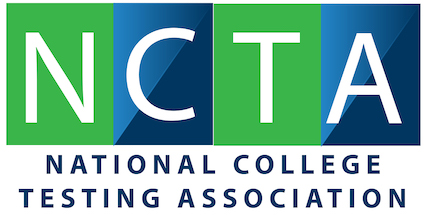NCTA Professional Standards and Guidelines: Introduction
PURPOSE AND BENEFITS
The NCTA Standards and Guidelines are intended to serve as a model for post-secondary test centers in the delivery of quality testing services. The term "test center" in this document refers to the office or portion of an office at an educational institution that is responsible for test administration duties. This includes delivery of national standardized tests, placement exams, classroom makeup tests, non-standard exam administrations for students with disabilities, certification exams, distance exams, etc. Since 2010, these Standards and Guidelines have been used in the NCTA Test Center Certification program to ensure that certified centers are following best practices.
This document contains two major divisions, the Standards and the Guidelines. The Standards contain policy and broader issues applicable to all test centers, while the Guidelines are very specific steps or procedures for Paper-Based Testing (PBT) and Computer-Based Testing (CBT). The Guidelines are intended to provide helpful information to new testing professionals, institutional personnel setting up a new test center, or test center staff who are reorganizing an existing test center.
The NCTA Standards and Guidelines endorse requirements without directly enforcing them, allowing discretion appropriate to specific programs. They have been and will continue to be updated by NCTA to reflect developments in the testing field. These Standards and Guidelines have important benefits for all involved in the testing process:
Benefits for Examinees
- Inform and promote quality test administration services for enrolled students, potential students, and community members.
- Offer the best opportunity for students to demonstrate their knowledge, potentially improving the accuracy of test results.
Benefits for Test Companies (any organization that contracts with test centers to administer tests)
- Promote standardized testing environments.
- Facilitate and simplify test site selection process by encouraging a pool of test centers that adhere to established standards.
- Improve communications with test centers by clarifying roles and expectations.
- Provide test company clients with a set of professional standards and guidelines.
- Promote a multi-user environment so that test centers may be compatible with the specifications of a variety of test companies.
- Raise the awareness of all parties regarding appropriate testing conditions and procedures for standardized testing.
- Provide Guidelines that can be used by test centers not on college campuses.
Benefits for Test Centers
- Enhance professional stature of test center and staff.
- Provide a single set of criteria, written by testing professionals of varying levels and perspectives, lessening the need to monitor and adhere to multiple sets of standards.
- Provide the information needed to establish an excellent test center with an optimal environment for enrolled and potential students, distance education students, and community members.
- Improve communications with test companies by encouraging more direct contact.
Benefits for Institutions
- Provide guidelines for professional testing services that reflect positively on the college or university.
- Support enrollment and retention by providing quality testing services to current and potential students.
- Provide quality services to people external to the institution, including community members who need to take certification exams or distance exams, enhancing stature and visibility of the institution.
- Support the institution's missions and standards.
Benefits for NCTA
- Demonstrate that enhancement of professionalism in the field of testing is a primary purpose of NCTA, increasing the value of belonging to an association with professional standards.
- Provide the underlying structure for the NCTA Test Center Certification program for test centers at educational institutions.
- Encourage interaction with non-member test centers and staff, as well as other associations and organizations, regarding testing standards and other concerns in the testing field, increasing NCTA resources.
|

